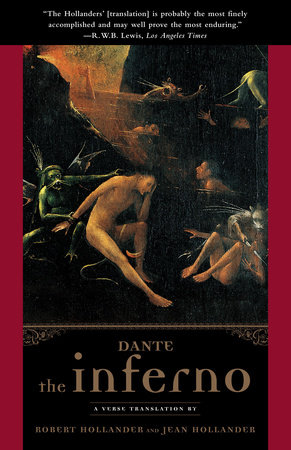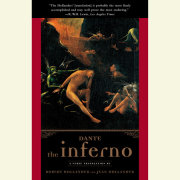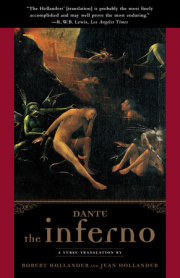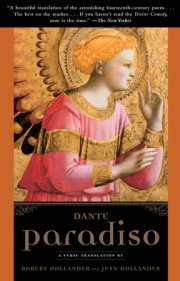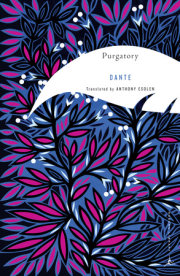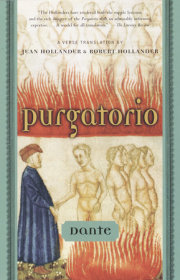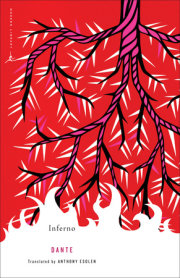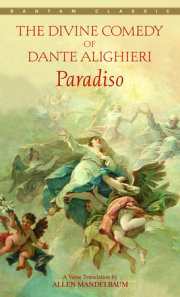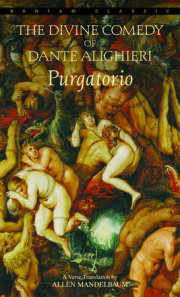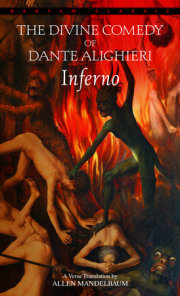INFERNO I OUTLINE 1–9 Dante, having lost his way, in a dark wood 10–21hint of dawn: the sun on a mountaintop 22–27simile: survivor of shipwreck looking back at sea 28–36journey resumed; ascending the slope; a leopard 37–43dawn and reassurance 44–54a lion renews his fear; a she-wolf drives him back 55–60simile: merchant (or gambler?) losing everything 61–66apparition (of Virgil) and Dante’s first words 67–75Virgil identifies himself 76–78his pointed question to Dante 79–90Dante’s recognition, praise of Virgil; plea for aid 91–100Virgil’s warning: power of the she-wolf 101–111Virgil’s prophecy of the hound that will defeat her 112–120Virgil will guide Dante through two realms to a third 121–129Virgil: a second guide will take him to those in bliss, since he is not allowed into that realm 130–135Dante agrees to be led through the first two realms 136the two set out
Inferno I Nel mezzo del cammin di nostra vita mi ritrovai per una selva oscura, 3ché la diritta via era smarrita.
Ahi quanto a dir qual era è cosa dura esta selva selvaggia e aspra e forte 6che nel pensier rinova la paura!
Tant’ è amara che poco è più morte; ma per trattar del ben ch’i’ vi trovai, 9dirò de l’altre cose ch’i’ v’ho scorte.
Io non so ben ridir com’ i’ v’intrai, tant’ era pien di sonno a quel punto 12che la verace via abbandonai.
Ma poi ch’i’ fui al piè d’un colle giunto, là dove terminava quella valle 15che m’avea di paura il cor compunto,
guardai in alto e vidi le sue spalle vestite già de’ raggi del pianeta 18che mena dritto altrui per ogne calle.
Allor fu la paura un poco queta, che nel lago del cor m’era durata 21la notte ch’i’ passai con tanta pieta.
E come quei che con lena affannata, uscito fuor del pelago a la riva, 24si volge a l’acqua perigliosa e guata,
così l’animo mio, ch’ancor fuggiva, si volse a retro a rimirar lo passo 27che non lasciò già mai persona viva.
Midway in the journey of our life I came to myself in a dark wood, 3for the straight way was lost.
Ah, how hard it is to tell the nature of that wood, savage, dense and harsh— 6the very thought of it renews my fear!
It is so bitter death is hardly more so. But to set forth the good I found 9I will recount the other things I saw.
How I came there I cannot really tell, I was so full of sleep 12when I forsook the one true way.
But when I reached the foot of a hill, there where the valley ended 15that had pierced my heart with fear,
looking up, I saw its shoulders arrayed in the first light of the planet 18that leads men straight, no matter what their road.
Then the fear that had endured in the lake of my heart, all the night 21I spent in such distress, was calmed.
And as one who, with laboring breath, has escaped from the deep to the shore 24turns and looks back at the perilous waters,so my mind, still in flight, turned back to look once more upon the pass 27no mortal being ever left alive. Poi ch’èi posato un poco il corpo lasso, ripresi via per la piaggia diserta, 30sì che ’l piè fermo sempre era ’l più basso.
Ed ecco, quasi al cominciar de l’erta, una lonza leggiera e presta molto, 33che di pel macolato era coverta;
e non mi si partia dinanzi al volto, anzi ’mpediva tanto il mio cammino, 36ch’i’ fui per ritornar più volte vòlto.
Temp’ era dal principio del mattino, e ’l sol montava ’n sù con quelle stelle 39ch’eran con lui quando l’amor divino
mosse di prima quelle cose belle; sì ch’a bene sperar m’era cagione 42di quella fiera a la gaetta pelle
l’ora del tempo e la dolce stagione; ma non sì che paura non mi desse 45la vista che m’apparve d’un leone.
Questi parea che contra me venisse con la test’ alta e con rabbiosa fame, 48sì che parea che l’aere ne tremesse.
Ed una lupa, che di tutte brame sembiava carca ne la sua magrezza, 51e molte genti fé già viver grame,
questa mi porse tanto di gravezza con la paura ch’uscia di sua vista, 54ch’io perdei la speranza de l’altezza.
E qual è quei che volontieri acquista, e giugne ’l tempo che perder lo face, 57che ’n tutti suoi pensier piange e s’attrista; After I rested my wearied flesh a while, I took my way again along the desert slope, 30my firm foot always lower than the other.
But now, near the beginning of the steep, a leopard light and swift 33and covered with a spotted pelt
refused to back away from me but so impeded, barred the way, 36that many times I turned to go back down.
It was the hour of morning, when the sun mounts with those stars 39that shone with it when God’s own love
first set in motion those fair things, so that, despite that beast with gaudy fur, 42I still could hope for good, encouragedby the hour of the day and the sweet season, only to be struck by fear 45when I beheld a lion in my way.
He seemed about to pounce— his head held high and furious with hunger— 48so that the air appeared to tremble at him.
And then a she-wolf who, all hide and bones, seemed charged with all the appetites 51that have made many live in wretchednessso weighed my spirits down with terror, which welled up at the sight of her, 54that I lost hope of making the ascent.
And like one who rejoices in his gains but when the time comes and he loses, 57turns all his thought to sadness and lament, tal mi fece la bestia sanza pace, che, venendomi ’ncontro, a poco a poco 60mi ripigneva là dove ’l sol tace.
Mentre ch’i’ rovinava in basso loco, dinanzi a li occhi mi si fu offerto 63chi per lungo silenzio parea fioco.
Quando vidi costui nel gran diserto, “Miserere di me,” gridai a lui, 66“qual che tu sii, od ombra od omo certo!”
Rispuosemi: “Non omo, omo già fui, e li parenti miei furon lombardi, 69mantoani per patrïa ambedui.
Nacqui sub Iulio, ancor che fosse tardi, e vissi a Roma sotto ’l buono Augusto 72nel tempo de li dèi falsi e bugiardi.
Poeta fui, e cantai di quel giusto figliuol d’Anchise che venne di Troia, 75poi che ’l superbo Ilïón fu combusto.
Ma tu perché ritorni a tanta noia? perché non sali il dilettoso monte 78ch’è principio e cagion di tutta goia?”
“Or se’ tu quel Virgilio e quella fonte che spandi di parlar sì largo fiume?” 81rispuos’ io lui con vergognosa fronte.
“O de li altri poeti onore e lume, vagliami ’l lungo studio e ’l grande amore 84che m’ha fatto cercar lo tuo volume.
Tu se’ lo mio maestro e ’l mio autore, tu se’ solo colui da cu’ io tolsi 87lo bello stilo che m’ha fatto onore. such did the restless beast make me— coming against me, step by step, 60it drove me down to where the sun is silent.
While I was fleeing to a lower place, before my eyes a figure showed, 63faint, in the wide silence.
When I saw him in that vast desert, ‘Have mercy on me, whatever you are,’ 66I cried, ‘whether shade or living man!’
He answered: ‘Not a man, though once I was. My parents were from Lombardy— 69Mantua was their homeland.
‘I was born sub Julio, though late in his time, and lived at Rome, under good Augustus 72in an age of false and lying gods.
‘I was a poet and I sang the just son of Anchises come from Troy 75after proud Ilium was put to flame.
‘But you, why are you turning back to misery? Why do you not climb the peak that gives delight, 78origin and cause of every joy?’
‘Are you then Virgil, the fountainhead that pours so full a stream of speech?’ 81I answered him, my head bent low in shame.
‘O glory and light of all other poets, let my long study and great love avail 84that made me delve so deep into your volume.
‘You are my teacher and my author. You are the one from whom alone I took 87the noble style that has brought me honor. Vedi la bestia per cu’ io mi volsi; aiutami da lei, famoso saggio, 90ch’ella mi fa tremar le vene e i polsi.”
“A te convien tenere altro vïaggio,” rispuose, poi che lagrimar mi vide, 93“se vuo’ campar d’esto loco selvaggio;ché questa bestia, per la qual tu gride, non lascia altrui passar per la sua via, 96ma tanto lo ’mpedisce che l’uccide;e ha natura sì malvagia e ria, che mai non empie la bramosa voglia, 99e dopo ’l pasto ha più fame che pria.
Molti son li animali a cui s’ammoglia, e più saranno ancora, infin che ’l veltro 102verrà, che la farà morir con doglia.
Questi non ciberà terra né peltro, ma sapïenza, amore e virtute, 105e sua nazion sarà tra feltro e feltro.
Di quella umile Italia fia salute per cui morì la vergine Cammilla, 108Eurialo e Turno e Niso di ferute.
Questi la caccerà per ogne villa, fin che l’avrà rimessa ne lo ’nferno, 111là onde ’nvidia prima dipartilla.
Ond’ io per lo tuo me’ penso e discerno che tu mi segui, e io sarò tua guida, 114e trarrotti di qui per loco etterno;ove udirai le disperate strida, vedrai li antichi spiriti dolenti, 117ch’a la seconda morte ciascun grida;
‘See the beast that forced me to turn back. Save me from her, famous sage— 90she makes my veins and pulses tremble.’
‘It is another path that you must follow,’ he answered, when he saw me weeping, 93‘if you would flee this wild and savage place.
‘For the beast that moves you to cry out lets no man pass her way, 96but so besets him that she slays him.
‘Her nature is so vicious and malign her greedy appetite is never sated— 99after she feeds she is hungrier than ever.
‘Many are the creatures that she mates with, and there will yet be more, until the hound 102shall come who’ll make her die in pain.
‘He shall not feed on lands or lucre but on wisdom, love, and power. 105Between felt and felt shall be his birth.
‘He shall be the salvation of low-lying Italy, for which maiden Camilla, Euryalus, 108Turnus, and Nisus died of their wounds.
‘He shall hunt the beast through every town till he has sent her back to Hell 111whence primal envy set her loose.
‘Therefore, for your sake, I think it wise you follow me: I will be your guide, 114leading you, from here, through an eternal place‘where you shall hear despairing cries and see those ancient souls in pain 117as they bewail their second death. e vederai color che son contenti nel foco, perché speran di venire 120quando che sia a le beate genti.
A le quai poi se tu vorrai salire, anima fia a ciò più di me degna: 123con lei ti lascerò nel mio partire;
ché quello imperador che là sù regna, perch’ i’ fu’ ribellante a la sua legge, 126non vuol che ’n sua città per me si vegna.
In tutte parti impera e quivi regge; quivi è la sua città e l’alto seggio: 129oh felice colui cu’ ivi elegge!”
E io a lui: “Poeta, io ti richeggio per quello Dio che tu non conoscesti, 132a ciò ch’io fugga questo male e peggio,che tu mi meni là dov’ or dicesti, sì ch’io veggia la porta di san Pietro e color cui tu fai cotanto mesti.” 136Allor si mosse, e io li tenni dietro.
‘Then you will see the ones who are content to burn because they hope to come, 120whenever it may be, among the blessed.
‘Should you desire to ascend to these, you’ll find a soul more fit to lead than I: 123I’ll leave you in her care when I depart.
‘For the Emperor who has his seat on high wills not, because I was a rebel to His law, 126that I should make my way into His city.
‘In every part He reigns and there He rules. There is His city and His lofty seat. 129Happy the one whom He elects to be there!’
And I answered: ‘Poet, I entreat you by the God you did not know, 132so that I may escape this harm and worse,
‘lead me to the realms you’ve just described that I may see Saint Peter’s gate and those you tell me are so sorrowful.’ 136Then he set out and I came on behind him.
Copyright © 2002 by Translated by Robert Hollander and Jean Hollander. All rights reserved. No part of this excerpt may be reproduced or reprinted without permission in writing from the publisher.

